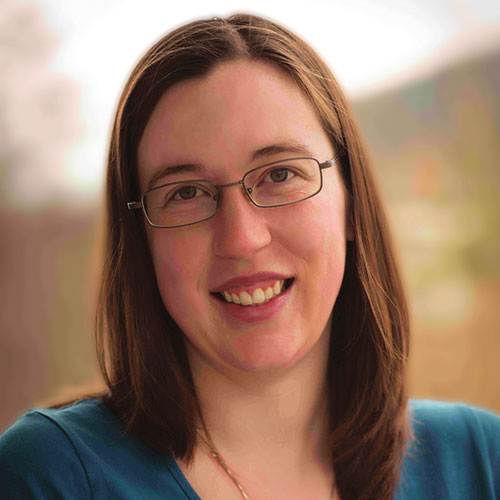
Medical issues from a mathematical angle: Sarah Haile ’03 uses biostatistics while researching diseases from cancer to COVID-19

This story originally appeared in the Spring 2023 edition of Wooster Magazine.
As a student at The College of Wooster, Sarah Haile ’03 (pronounced “highly”) learned the value of examining different perspectives. Every day in her work as a biostatistician at the University of Zurich’s Epidemiology, Biostatistics, and Prevention Institute, she appreciates the value Wooster placed on considering other beliefs, experiences, and views.
The lessons for the mathematics major and French and religious studies minor were in everyday college life. She lived in residence halls and interacted with people from all over the globe. In her French and Spanish classes, she read literature and watched films that helped her consider contrasting viewpoints. She and her classmates explored philosophies from around the world in religious studies classes. And she knew that playing cello by herself didn’t create an orchestra.
She also participated in a consulting project for Goodyear as part of AMRE, Wooster’s Applied Methods and Research Experience. “It was a great experience in learning how to talk to a group of people about a problem or task that I knew nothing about. Learning to ask the right questions and how to develop a plan of action was an important part of the process. I use those skills daily,” Haile said.
Her journey to biostatistics started at Wooster when she was choosing her major among the many subject areas she studied, including French, Spanish, religious studies, communication science and disorders, music, and math.
“I liked math enough that I took it every semester and often worked on those assignments first, but I shied away from declaring it as my major because I didn’t know what I would do with it,” she recalled. At the library, she found a book about career profiles of various people who had studied math, including someone who was a biostatistician. “I was intrigued. I had a few family members who had gone through bouts with cancer, but it never occurred to me that people with a math background were also essential to medical studies.” With that new-found knowledge, Haile declared mathematics as her major.
The career, which is extremely interdisciplinary, was a perfect fit for the integrative education
she received at Wooster. According to Haile, biostatisticians work closely with epidemiologists, medical doctors, and other health professionals to plan clinical trials and other medical studies to answer important questions related to medicine or public health. They talk about medical issues, research questions, and study populations. They figure out how to best measure the outcome of interest, consider what kind of bias might occur in a study, and how to reduce it. They design studies that answer research questions, think about how to communicate results to different audiences, and analyze the data and interpret the results.
“There are generally a lot of issues to consider and balance; it all needs to be communicated among people of different backgrounds,” Haile said. “The great thing about my job is that I’m always working on different projects with different people who have different specialties.” She has worked on studies related to cancer, cystic fibrosis, physical activity, sleep apnea, chronic obstructive pulmonary disease (COPD), and COVID-19, among others.
During her graduate studies at the University of Pittsburgh’s School of Public Health, Haile had a research position with a large cancer clinical trials group. She worked on a genetic test to predict the likeliness of cancer spreading in the body. The test was to help determine how necessary additional treatment might be in individual patients. Recently, she was happy to hear that the test was used to guide treatment decisions for someone close to her.

Photos provided by Sarah Haile
Moving internationally was not part of her original plan, “but sometimes life has other plans. I met somebody from Germany. Our wedding was timed at the end of my Ph.D., and we decided to move to Europe for a bit. Germany was the initial idea, but we landed in Switzerland instead due to his job, and I was hired at the University of Zurich. We have been there ever since,” she said.
From mid-2020 through mid-2022, she focused on COVID-19 research. Involved in a Swiss school-based study, Haile investigated seroprevalence in children, or how many have antibodies for COVID-19, indicating they had already been infected. “Along the way, we also learned about the effects of the vaccination, the incidence of long COVID, and kids’ quality of life and lifestyles during the pandemic,” she said. The results of the study informed policy decisions in Switzerland related to COVID-19 strategies in school-age children. “It’s been nice to see the direct effects of our work, especially when it affects my own kids.”
Haile likes the variety each workday offers and the ability to collaborate with professionals from a range of backgrounds. “There are new questions to answer and new challenges to design a study or analyze the data. Sometimes there are easy ways to answer them; sometimes it requires a bit of research; sometimes it needs a pragmatic solution; and sometimes we have to explore methods we’ve never used before.” For her, the best part is knowing she is part of a team that is solving real-life medical issues.
Posted in Alumni on March 15, 2023.
Related Posts
Related Areas of Study
Statistical & Data Sciences
Use statistics, math, and computer science to gain insights into data and solve real-world problems.
Major MinorPublic Health
Explore the many options and paths for those who want to be part of the world of health care
PathwayMathematics
Numbers + patterns + structures multiplied by a zest for analysis and inquiry
Major Minor

